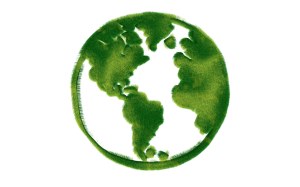
This week,
Union College awarded its 6th crop of Presidential Green Grant (PGG) awards. 20 different projects, proposed by students, staff, and faculty from all over campus, received between $700 and $2000 to support research projects to improve environmental conditions or initiatives to increase the sustainability of Union's operations.
Since 2007, we have awarded more than $75,000 to projects designed to reduce pollution, waste, and energy use; to increase energy efficiency, environmental education, and local food; and to generally support the tremendous creativity and drive in our own community on behalf of the environment.

These grants have become a key component of Union's research and
sustainability efforts. They are a crucial mechanism by which grassroots
ideas
from within our own community can get support to become a reality.
$2000 is practically chump-change for a large corporation, or even a Silicon Valley start-up in need of venture capital. But that seed money may be just the ticket to buy the supplies - and the moral support - needed for a project to go from the drawing board to reality. The combination of our financial support and our grantees' hard work has proven to be an unbeatable combination.
Today, thanks to PGGs, we have
an organic garden that supplies local food to our Dining Halls and local food missions. An early $2000 grant to study
the use of aerogels as an automotive catalytic converter led to more than $500,000 in grant funding from the National Science Foundation and at least one patent application. We have supported a variety of projects related to the
development of more efficient solar and wind technologies.
I can't wait to see what the research in chemistry, biology, and engineering in this years' proposals will accomplish. Or how our recycling, composting, and energy efficiency efforts will get even stronger.
The Green Grants would not be possible without the unwavering support of President Stephen Ainlay and his Administration, who has generously funded the PGG's since I proposed them in 2007. The last three years a grant to Union's Environmental Science, Policy, and Engineering Program from the Mellon Foundation has specifically funded research proposals related to the environment. I can't thank them enough for their commitment to environmental efforts at Union, and for their support of our community's initiatives.

































